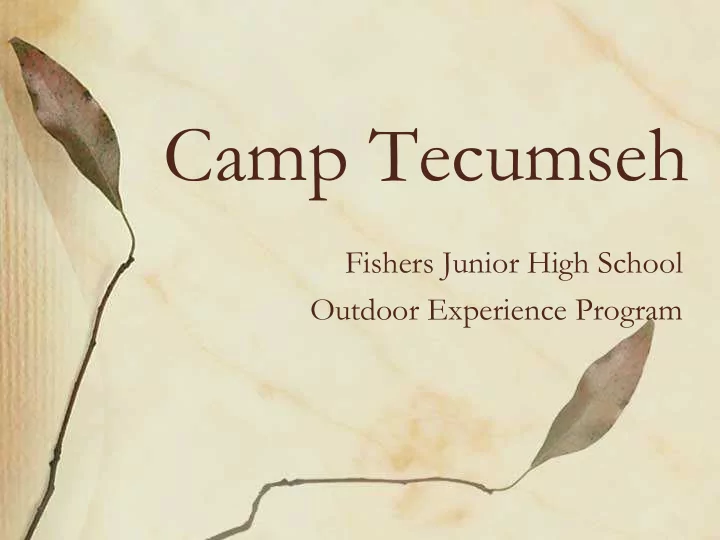

Camp Tecumseh Fishers Junior High School Outdoor Experience Program
• HEROES and STARS (A-K): Monday (April 20) to Wednesday (April 22) • Globetrotters and STARS (L-Z): Wednesday (April 22) to Friday (April 24)
• $135 • Friday (March 26, 2020) • Parent Chaperones do not pay • Balance has been shared with each student
• $5 • Ordered before Spring Break • Paid separately- Do not pay with camp fees
• It is outdoor education • We use the outdoors to teach and reinforce concepts in science and math • The learning classroom is 224 acres • The teachers are high school counselors and the class size is 8 to 10
• High academics • Varied experiences • Leaders • Role models • Trusted
What do we do?
What do we do?
What do we do? SCIENCE- 14 LESSONS • While hiking the students will take samples of moss and examine protists and “water bears” in the microscope room. • Students will take water samples and analyze the quality of camp’s main stream. • Weather observations will be made in conjunction with flying their balloon. Students will graph observation data in order to make a weather forecast to predict the flight of their hot air balloons. • During hikes on the nature trail, students may conduct a visual scavenger hunt. This activity will force the students to be observant and get to know the environment around them. • Students may examine the environment through their senses. • Students may find examples of all the kingdoms in a camp-wide search. • Students may study macroinvertebrates by sifting through the top layer of the creekbeds around camp. • Students may study physical animal adaptations on the camp mini-farm and may create an animal of their own • Students may examine/collect invasive garlic mustard that grows at the camp. • Students may study the turbidity of the pond and determine its effect on the organisms living in the pond. • Students may create a taxonomic key for the birds that are observed at camp. • Students may study the various types of erosion that have occurred at Camp. • Students may plot trees and examine the biome are around the trees.
What do we do? MATH- 4 Lessons •Students will learn to measure distances by pacing. This activity is designed to teach how practical math can be used in everyday life. •Study groups will solve a "timber cruising" problem that involves determining what trees should be cut and which trees should be left alone. This is a math activity using a Biltmore stick to measure various tree diameters to determine a tree’s sawlogs. •Practical math and teamwork are needed when the students calculate the rate of flow of a local stream and the amount of water that can be obtained from that stream. Students will learn how much water is needed to support a community. •The students may do a basic study of their velocity as they slide down the black hole.
What do we do? LANGUAGE ARTS- 7 Lessons • Students will write in a journal upon arrival at camp and prior to their departure • Science vocabulary will also be presented while at camp with a test upon return. • Students may read poem of Tecumseh’s teaching and connect it to their own lives. • Students may complete a creative writing assignment based upon their walk on the trails. • Students may complete a word search using the Tecumseh vocabulary • Students may go on a “blind” hike and reflect upon the experience in a short writing. • A variety of unique vocabulary and terminology is used at camp. The student may participate in a prediction activity using these terms. SOCIAL STUDIES- 4 Lessons • Compass readings will be employed to increase awareness of physical and geographic features that could help or hinder an early explorer. • Study groups may use a handheld GPS, along with their compass and pacing skills, to do some basic geocacheing. • Students may read a brief history of Tecumseh himself and write about a hypothetical scenario that changes history. • Students may create their own map of Camp Tecumseh.
Canoeing
Mt. Wood
The Black Hole
Hot Air Balloons
Square Dancing
Mr. Jackson’s Stories
Teacher and Counselor Skits
What do we do?
Frequently Asked Questions Is this school?
Frequently Asked Questions What if there is weather?
Frequently Asked Questions Do we take charter buses?
Frequently Asked Questions What is the dress code?
Frequently Asked Questions What about medicine? Medicine drop off is April 14 from 3-6.
Frequently Asked Questions • Is the food good? • Will they starve if they are a vegetarian? • What if they have food allergies?
Frequently Asked Questions • Are the cabins nice?
Frequently Asked Questions • Does everyone go? • Do they have to go? • Do they pick their groups? • When do they find out who is in their group, cabin, and table?
Frequently Asked Questions • How often do they get to look at the comforting glow of a screen?
Recommend
More recommend